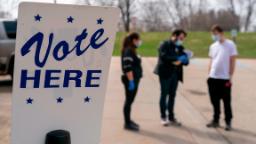
But that’s not how poll watching works, experts say.
Table Of Contents
What can poll watchers do?
Poll watchers, as the name implies, are expected to watch or observe what happens at polling places. Their primary job: Help ensure that their party has a fair shot at winning. Both parties do it.
But poll watchers can’t interfere in any way with the actual voting process.
They can closely monitor the administration of the election to ensure that votes are counted accurately. And in some states, poll watchers can also challenge an individual voter’s right to cast a ballot. Partisan poll watchers, however, must conduct those challenges through official poll workers and cannot stop or otherwise try to interfere with someone trying to vote.
Even if a poll watcher challenges an individual voter — for instance, by arguing that the person’s name doesn’t appear on the local voting rolls — states often allow that person to cast a “provisional” ballot to be counted later once his or her right to vote has been verified.
Poll watchers also can help turn out the vote by counting the voters who have cast ballots and helping their respective candidates track which potential supporters haven’t yet voted. That helps campaigns mount last-minute Election Day efforts to get those voters to cast their ballots before polls close.
If voters sees questionable actions or feel intimidated, they should seek the help of the trained election workers at the precinct, experts say.
Who can be a poll watcher?
In some cases, they must be registered voters in the specific precinct or county they are monitoring.
In Pennsylvania, for instance, poll watchers must reside in the county in which they are watching the polls. The Trump campaign has gone to court to try to overturn that law, which makes it harder for Republicans to find enough poll watchers to deploy to every polling place in Democratic strongholds such as Philadelphia.
And there are safeguards against random voters taking it upon themselves to serve as poll watchers. Some states, for instance, require that party officials or candidates designate who will observe polls.
They also must give the chief election judge in each polling place a list of designated observers — a further safeguard against a stray voter trying to police activity within a polling place.
Laws in many states also create buffer zones around polling places, another measure to protect against voter intimidation.
Why is this controversial?
But misleading rhetoric about voter fraud, much of it coming from the President, and some not-too-distant history have raised fresh concerns about the potential for voter suppression.
More than three decades ago, a GOP program that sent armed, off-duty law-enforcement officials to minority polling places in New Jersey sparked allegations of voter intimidation and resulted in a consent decree that sharply restricted the national party’s poll-monitoring activity.
That decree has expired, and November’s election marks the first presidential race since 1980 in which the Republican nominee and the Republican National Committee can work together on poll-watching.
The overheated rhetoric has, nonetheless, sparked worries about voter intimidation.
Richard Hasen, an election-law expert at the University of California at Irvine, told CNN last month that he’s worried about “rogue Trump supporters who might take matters into their own hands and go to polling places with Trump’s claims of fraud and voting problems.”